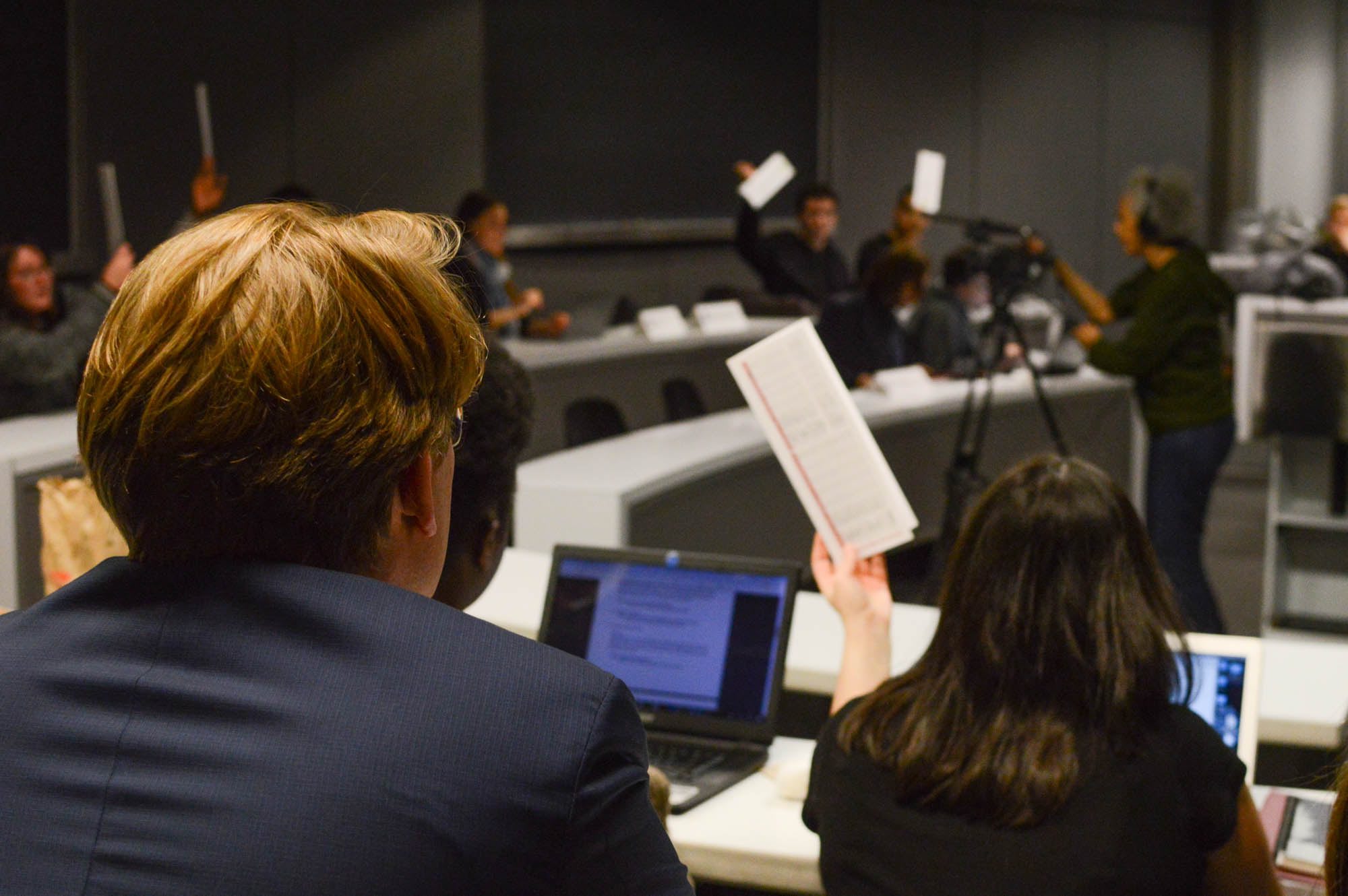WRITTEN BY IAN DOWN AND MINA MAZUMDER
——————————————————————————————————
A brief history of exclusion in university government
Déjà Vu
As the General Coordinator of the Concordia Student Union (CSU), Sophie Hough-Martin should have been on Concordia’s Senate.
According to the CSU’s standing regulations, the general coordinator and the academic and advocacy coordinator are ex-officio representatives of the CSU on Senate, Concordia’s senior academic governing body.
But earlier this term, Hough-Martin was denied a place on both Senate and the Board of Governors. At the time, she was in conditional academic standing, which, under Concordia’s bylaws, disqualified her from participating. Hough-Martin said that a major depressive episode in fall 2017 was the reason for her conditional standing. “I was unable to complete my coursework by the prescribed deadlines for an incomplete [grade],” she said.
Earlier this month, Hough-Martin’s academic standing was re-evaluated and she was no longer in conditional standing. However, the incident led to the revival of a 2016 Senate ad hoc committee on student eligibility. Hough-Martin and Mikaela Clark-Gardner, the CSU’s academic and advocacy coordinator, successfully requested to have the committee reconvene to review academic standing requirements for student representatives.
This is not the first time this year that Concordia students have had to fight for representation. In January, the administration announced that the two undergraduate and two graduate students who would participate in the Task Force on Sexual Violence would be chosen by the administration, not by the CSU. Although the administration reversed this decision a week later following a CSU press conference criticizing the recruitment process, it did not remove academic standing requirements for task force participants.
Sophia Sahrane, the research and education coordinator for the student advocacy organization Association for the Voice of Education in Quebec (AVEQ), criticized the requirements for discriminating against survivors of sexual violence. “How do you maintain a good academic standing when you have just been sexually assaulted?” she asked at a CSU press conference in February. “When you have had your agency taken away from you? […] When your abuser is your professor?”
Three years prior to the Task Force controversy, Lucinda Marshall-Kiparissis, then the CSU’s general coordinator, and Marion Miller, then a fine arts representative on Senate, were stripped of their rights as senators after participating in the 2015 student strikes. Their roles in the protests led to a sanction under Concordia’s Office of Rights and Responsibilities, which disqualified them from voting and participating in closed sessions. However, an ad hoc committee, the same one that reconvened last month, struck down this bylaw, and Miller and Marshall-Kiparissis had their rights as senators restored.
Uncommon Practice
“The majority view expressed over the years is that excluding students on conditional standing is not meant to penalize them but a way of helping them avoid additional burden so that they can focus on their studies and redress their academic standing,” said University Spokesperson Mary-Jo Barr.
“This seems to be kind of a dismissive approach from the Concordia institution,” said Guillaume Lecorps, president of the Quebec Student Union (QSU), which represents eight student associations from around Quebec. He said he was not aware of such regulations at any of the universities that the QSU represents.
In fact, Concordia is one of the only universities in Quebec with academic requirements for students who want to participate in school government. Bishop’s University is the only one with similar requirements.
Of the top 27 Canadian universities listed in the 2019 Times Higher Education ranking, only two—Carleton University and the Memorial University of Newfoundland—mention academic standing requirements in their bylaws. Concordia is in the bottom six rankings in a list which also includes the University of Toronto and the University of British Columbia.
The Legal Question
In a statement to The Concordian, Marshall-Kiparissis said that if Concordia’s administration wanted to “show respect for the new student representatives they allow, they should try actually abiding by the Accreditation Act instead of making excuses for their ‘interpretation’ of the law.”
Section 32 of Quebec’s Act respecting the accreditation and financing of students’ associations states that “An accredited students’ association or alliance may, alone, appoint students who, under an Act, regulation, by-law, charter or agreement, are called upon to sit or participate as student representatives on various councils, committees or other bodies in the institution.”
At a regular council meeting on Oct. 10, councillor Rory Blaisdell introduced a motion to allocate $10,000 towards taking legal action against the administration for allegedly violating the Accreditation Act. “We’re gonna take it to court, and we’re gonna have a judge come down and set the precedent, and say ‘No, Concordia, you can’t do this,’” he said. Council moved to go into closed session after the motion was introduced, and Blaisdell declined to comment on the proceedings.
However, a legal dispute between the CSU and the administration could be precedent-setting. Patrice Blais is vice president of Grievance and Collective Agreement for the Concordia University Part-time Faculty Association. He is also part of the ad hoc committee that is investigating the issue of academic requirements. Because of his place on the committee, he declined to offer an interpretation of the Accreditation Act. “However, I can tell you that this issue has not been the issue of litigation and there exists no jurisprudence currently on this issue, so any legal opinion has to be taken with a grain of salt,” he said.
* * *
Hough-Martin said the CSU’s executives will attend a steering committee on Oct. 30 to discuss the composition, timing and overview of what will be looked at on the ad hoc committee. Hough-Martin hopes this issue will be resolved by the end of her mandate.
“Students who are in precarious academic standing have even more interesting knowledge and life experience to bring to Senate,” Miller said, adding that they understand why students fall behind in their academics, and can suggest improvements that will help them, “So that’s a very valuable perspective to be getting.”
Archive graphic by Zeze Le Lin
